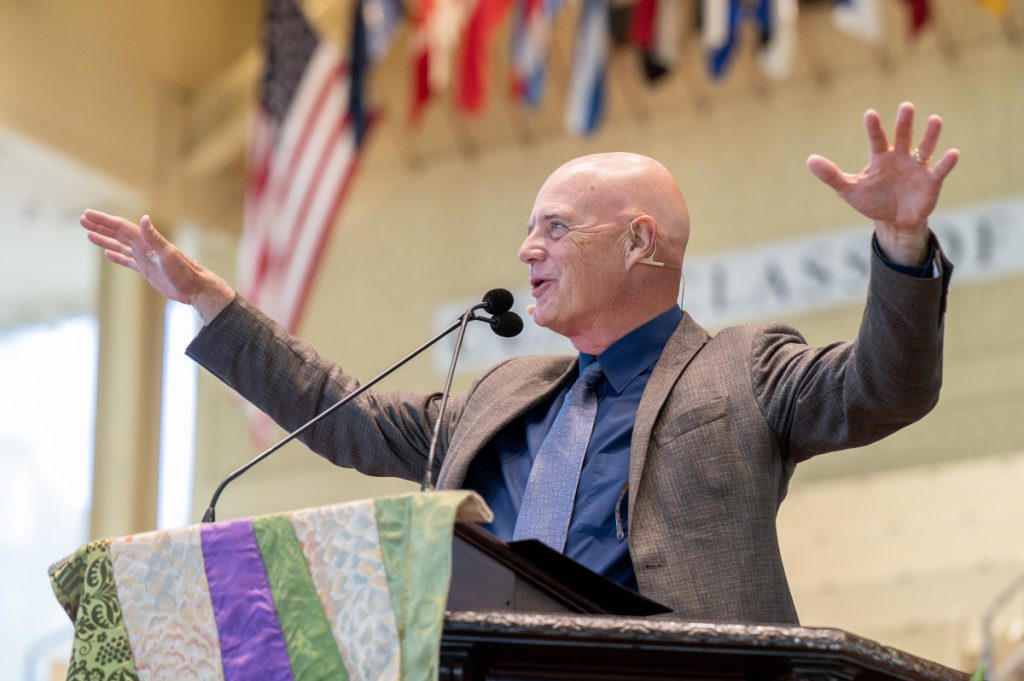
Column by Mary Lee Talbot
The Rev. Brian McLaren attended his 50th high school reunion in 2024. In high school, in his hippie days, he had long hair, a big beard and wore bell bottoms and a T-shirt.
“My friends would look at me and wonder who this old, bald guy was, but suddenly there was recognition in their eyes and we picked up where we had left off.”
He continued, “I remembered afterward feeling that we were sincerely interested in each other. Not like people you meet at a party and you find out everything there is to know about them but they learned nothing about you. Or, I was the person who never found out anything about you. I think religion is like that — so concerned with self, status and survival — that we forget that if we try to save our life we will lose it, but if we let go of our life, we will find something grand.”
McLaren preached at the 9:15 a.m. Thursday morning worship service in the Amphitheater. His sermon title was “Paul’s Tradition in Travail,” and the scripture reading was Romans 8:18-27.
He told the congregation that he knew the Apostle Paul got mixed reviews. “Paul was certainly concerned about the fledgling movement that would later become Christianity, but I think Paul knew that this movement did not and could not exist for itself. It had a bigger vision, a larger vision for the common good; a vision for the whole world, a vision not just for human beings, but for all of creation.”
McLaren said all faiths face this challenge, to move from concern about the well-being of the tradition to the survival of all. In the letter to the Romans, Paul’s concern is for all creation, not just the little Christian movement. Paul mentions creation a number of times: Creation awaits to be set free from decay, creation looks to obtain the glory of the children of God, it suffers the pains of labor and humans feel that groaning all around them.
Quoting Father Richard Rohr, McLaren said, “He taught us that the great lesson of life is that life is not about us. We are about life.”
Paul suggested that the same Spirit that hovered over creation is still alive in every breath of creation. “It is groaning in labor pains, looking for liberation from decay,” McLaren said.
He noted that the traditional interpretation for the decay of creation was to punish Adam and Eve. “I think that is bonkers. (There was applause from the congregation.) It doesn’t make sense at all. I think what is a much more obvious and more legitimate way to read the text, and others who think that, there are two of us — you and me, I hope.”
Mclaren continued, “I believe that creation has been subject to human beings and human beings have walked on the earth with such arrogance and carelessness wanting to ‘till, baby, till,’ and ‘drill, baby, drill’ and never care for this precious earth that is our home. Worse than a teenager who lives in his room for six months without ever picking up a dirty sock, dirty underwear or ever cleaning under the bed, we’ve soiled our home. We subjected the earth to imbalance and decay. What needs to happen, Paul says in Romans, is that the human species has to finally grow up and start actually acting like human beings are supposed to act — responsible, not arrogant; caring about everyone, not just ourselves.”
Paul was not the uptight, religious fundamentalist, McLaren said. He used a female metaphor to describe the pain the world was in — labor pains. “It is one of the most powerful metaphors in all of human experience — that creation is suffering labor pains, trying to give birth to something new.”
McLaren continued, “Just imagine for a few moments, especially if you have a bad opinion of Paul — which I can’t blame you for having, not so much because of Paul, but because of the colonizer men who have used Paul for their purposes. I would like you to imagine that Paul was a deep, visionary, spiritual mystic to whom something happened that shook up his arrogant colonizer mindset.”
Things are not as they should be in the nation, our civilization, our species, even within ourselves. McLaren said even the trees, the fish, the birds can feel it. “They all experience the same malady — that humans have a knee on the neck of the living earth, they won’t let it breathe.”
If humans don’t feel the death pains, if we don’t feel the doom, we are not paying attention, he told the congregation. Paul, though, suggests that these could be labor pains, that something new is trying to be born. The new life cannot come to fruition lightly, there has to be pain, contractions and transitions.
In 2025, McLaren said, we hear the groaning of the ice sheets in the Arctic and Antarctic as they crack and split and melt into tears. He told the congregation that we hear the ground tonight in the beautiful call of the crickets, and also hear the lament for the great die-off reducing the biomass of insects that play such an important part in the beautiful balance of the whole.
He said, “You feel it in yourself as you look around at what humans are doing to each other, what we’re doing to hallowed traditions, values that have sustained our ancestors. You even feel it in yourself and you ask yourself, who subjected the earth to this oppression, this exploitation, this harm? It was our species, our species in a lustful orgy of arrogant domination and decadent profit-taking “
Something is trying to be born — a new humanity, not up in heaven with a harp but embodied on earth. “Jesus saw the need for all our species to be born again and Paul saw a new way of being human on earth,” McLaren said.
He shared a story from Sikh activist Valarie Kaur about giving birth. In birthing labor, Kaur said, there is a stage that is the most painful stage, the final stage in labor, where the body expands to 10 centimeters. The contractions come so fast that there’s barely time to breathe. It feels like dying, and is called transition.
“I would not have called it that,” Kaur said. “During my transition I remember the first time the midwife said she could see the baby’s head, but all I could feel was a ring of fire. And I turned to my mother and I said, ‘I can’t.’ And my mother, her hand on my forehead was whispering in my ear, ‘You are brave, you are brave.’ Just then I saw my grandmother stand behind my mother and her mother behind her, and her mother behind her, a long line of women who had pushed through the fire before me. I took a breath. I pushed. And my son was born.”
McLaren said, “What if the darkness in our country and in our world is not the darkness of the tomb, but the darkness of the womb? What if all of our ancestors who pushed through the fire before us, who survived genocide, and colonization, slavery, and sexual assault, what if they are standing behind us now whispering in our ears, ‘You are brave, you are brave’? What if this is our great time of transition?”
He continued, “Will we give birth to new traditions from old traditions? There is a world waiting to be born with an identity in the divine community. We can rediscover our identity as children of God. May something new be born from our traditions. May something new be born.” The congregation applauded.
Melissa Spas, vice president for religion at Chautauqua, presided. Alicen Robert, student minister in the Department of Religion for 2025, read the scripture. For the prelude, Barbara Hois, flute, and Willie LaFavor, piano, both members of the Motet Consort, performed “Nocturne – Pièce courte,” by Lili Boulanger. The Motet Choir sang “O Thou who Camest from Above,” music by Philip W.J. Stopford and text by Charles Wesley as the prelude. The choir was under the direction of Joshua Stafford, director of sacred music and Jared Jacobsen Chair for the Organ, and accompanied by Owen Reyda on the Massey Memorial Organ. Reyda played “Allegro con Spirito,” by Frank Bridge on the Massey Organ for the postlude. Support for this week’s preaching and chaplaincy is provided by the Robert D. Campbell Memorial Chaplaincy and the Daney-Holden Chaplaincy Fund.




